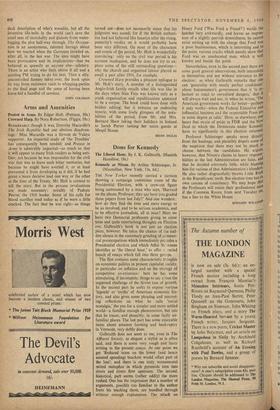Dons for Kennedy
Kennedy or Nixon. By Arthur Schlesinger, Jr. (Macmillan, New York, 13s. 6d.) THE New Yorker recently carried a cartoon showing a campaign committee room of the Presidential Election, with a crew-cut figure being summoned by a man who says, 'Harvard on the phone, Professor; they say have you graded those papers from last July?' And one wonders: how do they find the time and mere energy to be so involved, and to be serious academics, and to be effective journalists, all at once? Here we have two Democrat professors giving us some terse and quite entertaining thoughts on Election eve. Galbraith's book is not just an election piece, however. He takes the chance of the sud- den silence in the customary grinding of commer- cial preoccupations which immediately precedes a Presidential election and which Adlai Stc venson identifies as 'the liberal hour,' to offer E' varied bunch of essays which fall into three grco ps.
The first contains some characteristic thoughts on economic politics in present capitalist society, in particular on inflation and on the strategy of competitive co-existence: here he has some stimulating, if incomplete, things to say a'....out the supposed challenge of the Soviet rate of growth. In the second part he seeks to expose various 'legends' or 'myths' of American economic his- fory, and also gives some pleasing and interest- ing reflections on what he calls 'social nostalgia,' the yen for a simpler and more settled world—a familiar enough phenomenon, but one that he traces, and plausibly, in some fairly un- familiar places. The last part has some enjoyable items about amateur farming and bankruptcy in Vermont, very deftly done.
Galbraith does not seem to me, even in The Affluent Society, as elegant a stylist as is often said, and there is some very rough and hasty writing in the present essays. At one point we get 'Reduced taxes on the lower (and hence assured spending) brackets would offset part of the loss; and there is one truly monumental mixed metaphor in which pyramids turn into rivers and rivers flow upstream. The second, historical, part seems (rather oddly) the more rushed. One has the impression that a number of arguments, possibly too familiar to the author from his teaching them, are bundled through without enough explanation. The attack on
Henry Ford ('Was Ford a Fraud?') wields the hatchet very awkwardly, and leaves an impres- sion of a slightly peevish donnishness; he cannot resist mixing up with the charge that Ford was a poor businessman, which is interesting and to the point, various cracks which merely show that Ford was an uneducated man, which is well known and beside the point.
Nevertheless, even in the second part there are some good general observations, both interesting in themselves and not without relevance to the election: as when Galbraith remarks that one can 'generalise with nearly perfect confidence about businessmen's government that it 'is re- luctant to react to unrealised dangers,' that it will always wait and see; or when he writes, 'The American government works far better—perhaps it only works—when the Federal Executive and influential business and the respectable Press are in some degree at odds.' Here, as elsewhere, one hears that strain of pride in FDR and the New Deal to which the Democrats under KennedY have so significantly in this election returned.
Professor Schlesinger speaks more directly from the hustings, and plausibly dispels some of the suspicion that there may not be much to choose between the candidates. He argues, however, that Nixon's claims to heavy responsl: bilities in the last Administration are false, and that he decided extremely little, while blaming him for various of that Administration's blunders. He also rather disgracefully throws Little Rock in the Republicans' teeth. But election time has its own canons of consistency. We may hope that the Professors will retain their professional ones if the Common Room, from next Tuesday 0°, has a line to the White House.
BERNARD WILLIAMS














































 Previous page
Previous page